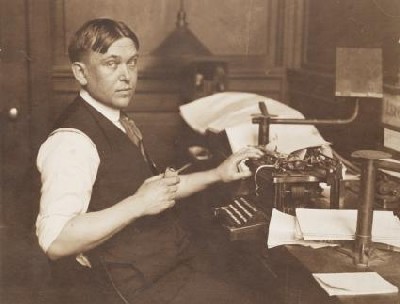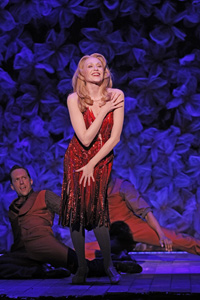Leadbelly and John Lomax appear in a 1935 March of Time newsreel:
(This is the latest in a weekly series of arts-related videos that appear in this space each Wednesday.)
Archives for June 2011
TT: Almanac
“Of all the arts I suppose that writing is the one which develops the lowest attributes, in that its very pursuit magnifies all the human failings. It encourages introversion, neurasthenia, insomnia, irritability and all forms of self-indulgence. It encourages a sensitiveness which makes one open to any sort of slight. It begets a type of personal inflation, for it is nearly impossible to continue without the consciousness of a definite gift of genius. It may be that one is misunderstood by editors, perhaps because one is too far advanced to be comprehended by the simple moron mind. It may be that this hidden gift still lies fallow, but there must be an inner conviction of its presence. It is what enables an author to walk airily among his colleagues and to dispense and to receive the bitter little condescensions of the trade. There is a jealousy in the writing profession which is peculiarly its own.”
John P. Marquand, Wickford Point
TT: One is a wanderer
 I left my home town a few months after graduating from high school in 1974, and since then I’ve only returned as a visitor. Not so David, my younger brother, who chose to settle in Smalltown, U.S.A., and has never lived anywhere else. He and his wife live three blocks from my mother’s house. If there’s such a thing as a model citizen, he fills the bill with room to spare. Among countless other valuable things, he’s served two terms on the city council and is a member of the board of trustees of his church, and whenever anyone in Smalltown now has occasion to mention the name “Teachout,” they usually mean him, not me.
I left my home town a few months after graduating from high school in 1974, and since then I’ve only returned as a visitor. Not so David, my younger brother, who chose to settle in Smalltown, U.S.A., and has never lived anywhere else. He and his wife live three blocks from my mother’s house. If there’s such a thing as a model citizen, he fills the bill with room to spare. Among countless other valuable things, he’s served two terms on the city council and is a member of the board of trustees of his church, and whenever anyone in Smalltown now has occasion to mention the name “Teachout,” they usually mean him, not me.
I’m proud of my brother’s achievements, and more than a little bit jealous of them. In particular I envy his deep roots in the soil of Smalltown. I can’t claim to feel that way about New York City, where I’ve lived for the past quarter-century but to which I have no special attachment save for my love of certain people who live there.
For me, “home” is where Mrs. T is, and that changes from day to day. We moved to a new apartment last November, but we’ve spent so little time there that most of our belongings are still packed in cardboard boxes. So far this year we’ve “lived” in upper Manhattan, rural Connecticut, various parts of Florida, and a string of hotel rooms in Chicago, San Diego, and Washington, D.C. Right now we’re in Smalltown, but we’ll be driving up to St. Louis on Thursday, and a week and a half after that we’ll be on our way to Pittsburgh.
Truth to tell, I’m about as close to rootless as you can get, and because I come from Smalltown, where people tend as a rule to grow where they’re planted and stay where they’re put, this rootlessness has always seemed strange to me. I ought to feel at home somewhere or other, but when I moved away in 1974, I lost the sense of belonging that I possessed throughout the first eighteen years of my life, and since then I’ve never managed to recapture it.
This came as a surprise to me. I always figured I’d find a job in town, marry a Smalltown girl, start a family, and become a pillar of the community. My brother did those things, but I pulled up stakes and became a rambling man, moving from city to city in search of an identity that it took me the better part of a lifetime to find, insofar as I can be said to have found it. At various times in my life I expected to become a concert violinist, a lawyer, a high school teacher, and a psychotherapist, none of which I ended up doing. Instead I’ve paid the rent by working as a bank teller, a jazz bassist, a magazine editor, an editorial writer, a biographer, and a drama critic.
 My brother and I, in short, have both led typical American lives. It is fully as American to stick close to home as it is to become a wanderer, but it’s the wanderers who get most of the press, perhaps because we’re the ones who write it–and I’m not so sure it should be that way. I left home to find myself, but my brother didn’t have to leave home because he knew who he was. I call my mother every night, but he sees her every day. I write books, but he has a grown daughter. I like to think that my work may ultimately prove to have some lasting value, but I’m sure that he’s done more to make the world a better place.
My brother and I, in short, have both led typical American lives. It is fully as American to stick close to home as it is to become a wanderer, but it’s the wanderers who get most of the press, perhaps because we’re the ones who write it–and I’m not so sure it should be that way. I left home to find myself, but my brother didn’t have to leave home because he knew who he was. I call my mother every night, but he sees her every day. I write books, but he has a grown daughter. I like to think that my work may ultimately prove to have some lasting value, but I’m sure that he’s done more to make the world a better place.
Might I have been happier had I stayed in Smalltown? That is, needless to say, the least answerable of questions, though Stephen Sondheim went part way towards answering it in a song from Follies called “The Road You Didn’t Take”: The choices that you make/Aren’t all that grim./The worlds I’ll never see/Still will be around,/Won’t they?/The Ben I’ll never be,/Who remembers him? Nobody remembers the nonexistent Terry Teachout who stayed home and became a schoolteacher, but everybody in Smalltown, U.S.A., knows his real-life brother David, who had the luck to know which road to take–and the sense to take it. As much as I love my life, I’ll always wonder which one of us made the better call.
TT: Only once
 A colleague of mine has just published his first book, a great day that puts me in mind of my favorite paragraph from H.L. Mencken’s Newspaper Days, in which Mencken recalled an equally great day that took place when he was working under Lynn Meekins at the now-defunct Baltimore Herald. I reprint it here in tribute to my fortunate colleague.
A colleague of mine has just published his first book, a great day that puts me in mind of my favorite paragraph from H.L. Mencken’s Newspaper Days, in which Mencken recalled an equally great day that took place when he was working under Lynn Meekins at the now-defunct Baltimore Herald. I reprint it here in tribute to my fortunate colleague.
* * *
I recall, in point, the day when the proofs of my first real book, “George Bernard Shaw: His Plays,” came in. It was a small volume, else I could not have found the time to write it at all, but it was nevertheless a book, set up and to be published by a real publisher, and I was so enchanted that I could not resist taking the proofs to the office and showing them to Meekins–on the pretense, as I recall, of consulting him about a doubtful passage. He seemed almost as happy about it as I was. “If you live to be two hundred years old,” he said, “you will never forget this day. It is one of the great days of your life, and maybe the greatest. You will write other books, but none of them will ever give you half the thrill of this one. Go to your office, lock the door, and sit down to read your proofs. Nothing going on in the office can be as important. Take the whole day off, and enjoy yourself.” I naturally protested, saying that this or that had to be looked to. “Nonsense!” replied Meekins. “Let all those things take care of themselves. I order you to do nothing whatsoever until you have finished with the proofs. If anything pops up I’ll have it sent to me.” So I locked myself in as he commanded, and had a shining day indeed, and I can still remember its unparalleled glow after all these years.
TT: Almanac
“It was amusing to observe that Allen became hesitant, now that he reached the point, and I knew how he felt. He was no longer Dr. Southby, but a tyro who desired a favorable judgment or none at all. He was like a young writer in an editor’s office, explaining the inner meaning of what he had written so that one could understand it before one read it.”
John P. Marquand, Wickford Point
TT: It was twenty years ago today
 Time falls away when I visit my mother in Smalltown, U.S.A., though not because Smalltown is in any way behind the times. (No place in America is behind the times–network TV has seen to that.) Rather, it’s because I slip slightly out of sync with my big-city routine each time I come here. So far, this trip has been no exception. Not only do I have no deadlines to hit, but in order to check my e-mail, I have to hop in my rented car and drive to one of the three fast-food joints out by the highway that are equipped with free wi-fi. This has the relaxing effect of cutting me off from the ceaseless hum and buzz of New York, and it also puts me in touch with things I wouldn’t have encountered in my unpeaceable urban cocoon.
Time falls away when I visit my mother in Smalltown, U.S.A., though not because Smalltown is in any way behind the times. (No place in America is behind the times–network TV has seen to that.) Rather, it’s because I slip slightly out of sync with my big-city routine each time I come here. So far, this trip has been no exception. Not only do I have no deadlines to hit, but in order to check my e-mail, I have to hop in my rented car and drive to one of the three fast-food joints out by the highway that are equipped with free wi-fi. This has the relaxing effect of cutting me off from the ceaseless hum and buzz of New York, and it also puts me in touch with things I wouldn’t have encountered in my unpeaceable urban cocoon.
On Sunday I woke up at eight, drove to Burger King, and booted up my MacBook to see what was going on in the world. As I sipped orange juice and downloaded my e-mail, I heard playing in the background a song from Stephen Stills’ Manassas, an album that I hadn’t thought about, much less listened to, since high school. (Did Stephen Stills ever expect to become Muzak?) It instantly put me in mind of myself when young, sitting in my bedroom and flailing away at my twelve-string guitar, trying as best as I could to master the complicated guitar licks that I gleaned from the albums I bought each week with my carefully hoarded allowance.
As I drove home, I saw a blood-red cardinal perched on a fence post, and marveled at the gaudy sight. The only birds I see in Manhattan are pigeons, which says more about me than it does about Manhattan. I almost never notice things there. Instead, I think about the next thing: the next deadline, the next appointment, the next show I have to review. Not so in Smalltown, where I have time to look at what’s around me instead of what’s in my head.
 Because I grew up in Smalltown, much of what’s around me makes me think of my youth, something I don’t often do when I’m in New York. Each time I open the front door of my mother’s house, for instance, I can see at the end of the block the elementary school that I attended a half-century ago, and if it’s recess time on a weekday, I can also hear hundreds of children gleefully yelling their heads off. Fifty years after the fact, I know that Matthews Elementary School was designed in the prairie-hugging manner of Frank Lloyd Wright, and that incongruously worldly fact makes me smile. Back then all I knew was that recess was the time of day I liked least, the hour when I had to pretend to enjoy playing games. If only I could have pretended that I was good at them! Left to my own devices, I would have been more than happy to spend recess sitting at my desk with my nose firmly planted in a book.
Because I grew up in Smalltown, much of what’s around me makes me think of my youth, something I don’t often do when I’m in New York. Each time I open the front door of my mother’s house, for instance, I can see at the end of the block the elementary school that I attended a half-century ago, and if it’s recess time on a weekday, I can also hear hundreds of children gleefully yelling their heads off. Fifty years after the fact, I know that Matthews Elementary School was designed in the prairie-hugging manner of Frank Lloyd Wright, and that incongruously worldly fact makes me smile. Back then all I knew was that recess was the time of day I liked least, the hour when I had to pretend to enjoy playing games. If only I could have pretended that I was good at them! Left to my own devices, I would have been more than happy to spend recess sitting at my desk with my nose firmly planted in a book.
In 1991 I published a memoir of my childhood and youth. It contains the following passage:
The bald facts of a big city, its tall buildings and storied landmarks, give it a surface glamour that needs no explaining. A small town needs lots of explaining. It has no tall buildings, and the landmarks are all in your mind. When you look up, you see the sky; when you show somebody the sights, you see yourself.
It doesn’t seem possible that I published that book–my first book–twenty years ago. Much has happened to me since then, far more than I ever thought possible, some of it hurtful but most of it lovely and amazing. Among other things, I’ve practiced my craft on a near-daily basis, and I hope that I write better now than I did then. Yet I continue to stand by that passage, for it seems to me to embody a fundamental truth about what it feels like to return home to the place where you grew up.
I wouldn’t want to be a child again, much less a teenager, but I’m glad to see the past all around me each time I come back to Smalltown for a visit. It reminds me of who I am and where I come from, and those are precious things to know.
TT: Almanac
“I wish to goodness my life were not always a circle. I wish I were not always resting beneath the umbrella of my own personality.”
John P. Marquand, The Late George Apley
TT: Getting Follies right
In today’s Wall Street Journal I cheer loudly for the new Kennedy Center revival of Stephen Sondheim’s Follies. Here’s an excerpt.
* * *
Of all the major postwar musicals, “Follies” may be the hardest to revive successfully. Not only was it one of the largest-scaled Broadway shows to come along prior to the Era of Falling Chandeliers, but the subject matter of “Follies,” a caustic study of two middle-aged marriages gone sour, is disturbing in a way likely to put off casual dinner-and-a-show theatergoers. Factor in Stephen Sondheim’s magnificent score, which is too musically complex to be done well by most theater companies and too popular in style to be done at all by most opera houses, and you’ve got a recipe for obscurity.
 Yet “Follies” somehow keeps on getting done, albeit not often, and each production is a magnet for Mr. Sondheim’s ardent fans, who will travel as far as necessary to see a performance, be it good, bad or indifferent. So it is great and glorious news indeed that the Kennedy Center’s new revival, whose near-ideal cast includes Bernadette Peters and Jan Maxwell, is not just good but superlative….
Yet “Follies” somehow keeps on getting done, albeit not often, and each production is a magnet for Mr. Sondheim’s ardent fans, who will travel as far as necessary to see a performance, be it good, bad or indifferent. So it is great and glorious news indeed that the Kennedy Center’s new revival, whose near-ideal cast includes Bernadette Peters and Jan Maxwell, is not just good but superlative….
One of the signal achievements of this “Follies” is that it succeeds in untangling each and every strand of the show’s knotty plot. Most of the credit belongs to Eric Schaeffer, the director, whose Signature Theatre has produced more Sondheim revivals than any other regional theater company in America. Mr. Schaeffer is clearly unafraid of the darkness of “Follies,” so much so that the first act is bitter enough to sting. Yet he and Warren Carlyle, the choreographer, just as clearly revel in the richness of the knowing pastiche songs with which Mr. Sondheim evokes the popular music of the pre-rock era. It helps that they were given a budget big enough to produce “Follies” on a grand scale–and to hire a top-flight set designer, Broadway’s Derek McLane, with enough imagination to make the most of the materials at hand.
The result is a “Follies” that is superior in every way to the lackluster, ill-sung 2001 Broadway revival….
* * *
Read the whole thing here.
This rare home movie shot during a performance of the original 1971 Broadway production of Follies (with an overdubbed soundtrack recorded directly from the production soundboard) shows the transition to the second-act “Loveland” sequence. The set was designed by Boris Aronson:
